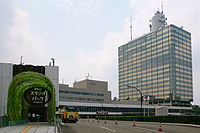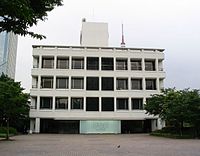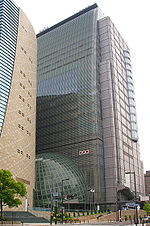- NHK
-
Nippon Hōsō Kyōkai (NHK)
日本放送協会
NHK logo, known as "the NHK eggs". The logo's main structure has scarcely changed since 1953.Type Broadcast radio network
and Broadcast television networkCountry Japan Availability Nationwide and Worldwide Slogan まっすぐ、真剣。("Straightforward, earnest") Area Shibuya, Tokyo Owner Public Broadcast Launch date March 22, 1925 (radio)
1953 (television)Former names Japanese Radio Station (1925-26) Official website nhk.or.jp Availability Terrestrial General TV Digital–Ch 1 (Tokyo)
Digital–Ch 2 (Osaka)
Digital–Ch 3 (Nagoya)Educational TV Digital- Ch 2 (Tokyo, Osaka, Nagoya) Satellite BS-1 Digital-Ch 101 BS-PREMIUM Digital- Ch 103 NHK WORLD nhkTV, nhkRadio Japan NHK (日本放送協会, Nippon Hōsō Kyōkai; official English name: Japan Broadcasting Corporation) is Japan's national public broadcasting organization.[1] NHK, which has always identified itself to its audiences by the English pronunciation of its initials,[2] is a publicly owned corporation funded by viewers' payments of a television license fee.
NHK operates two terrestrial television services (NHK General TV and NHK Educational TV), two satellite television services (NHK BS-1 and NHK BS Premium, both now a High-definition television service), and three radio networks (NHK Radio 1, NHK Radio 2, and NHK FM).
NHK also provides an international broadcasting service, known as NHK World. NHK World is composed of NHK World TV, NHK World Premium, and the shortwave radio service NHK World Radio Japan. World Radio Japan also makes some of its programs available on the internet.
Contents
History
Until the 1940s, NHK was a national radio broadcasting monopoly.[2][3]
On March 22, 1925, one and a half years after the Great Kantō earthquake, the Radio Japan produced the first radio broadcast in Japan, transmitting from Atago Hill just north of the Tokugawa Tombs in Shiba Park. The first program included Beethoven, classical Japanese music, and a play by ōyō.[2] In the same year, there were also broadcasts from Osaka and Nagoya.[4]
NHK was founded in 1926, modeled on the BBC radio company of the United Kingdom.[2] NHK evolved from the amalgamation of the three regional broadcasting corporations. This merger and reorganization was carried out under the auspices of the pre-war Ministry of Communications.[5]
NHK’s second radio network was started in 1931. And in 1935, NHK started a shortwave radio service for listeners overseas, which was known as ’’‘Radio Japan’’’ in 1930s and 1940s.
In November 1941, the Imperial Japanese Army nationalised all public news agencies and coordinated their efforts through the Information Liaison Confidential Committee.[citation needed] All published and broadcast news reports became official announcements of the Imperial Army General Headquarters in Tokyo for the duration of World War II. The famous Tokyo Rose wartime programs were broadcasts by NHK.[2]
In 1950, post-war three radio rules were enacted including the Broadcast Law (“Hōsō Hō”), and they replaced the pre-war Radio Telegraph Law. Under this law, NHK started afresh as a special corporation to be supported by audiences.[6]
NHK started General TV in 1950 and the Educational TV in 1959. It aired its first color television broadcast in 1960.
In 1980s, NHK BS TV broadcasts were started.[7] And in 1995, NHK started ’’‘NHK World TV’’’.
In 2000, NHK started satellite digital TV broadcasts. And in 2003, terrestrial digital TV broadcasts were started for three megacity areas, which are to be expanded to cover almost all Japan by July 2011.
NHK BS Hi-Vision analog TV was stopped by September 2007.
Since End of September 2008, NHK World TV can be received Free-To-Air over the Astra 19.2°E (Astra 1L) in Europe.
As of 28 November 2008,[8] NHK World TV was seen to start Test transmissions on the Eurobird series of satellites, Free to Air, at 28.5 Degrees East. The transmissions, on 11.680 GHz (Vertical polarity, FEC 2/3, S/R 27.5MBaud), currently appear only by adding the channel manually on Sky Digital equipment, and the channel is currently recognised by a code number, “51108”. It is not currently known how long this service will be available for, or what the plans for NHK World presently are. It appears in the Freesat EPG on channel 209.
License fee
NHK is paid for by license fees (known in Japanese as reception fee (受信料 Jushinryō)). The Broadcast Law which governs NHK’s funding stipulates that any television equipped to receive NHK is required to pay. The fee is standardized,[9] with discounts for office workers and students who commute, as well a general discount for residents of Okinawa prefecture.
However, the Broadcast Law lists no punitive actions for nonpayment; as a result of this, after a rash of NHK-related scandals, the number of people who had not paid the license fee surpassed one million users.[citation needed] This incident sparked debate over the fairness of the fee system.[10] In 2006, the NHK opted to take legal action against those most flagrantly in violation of the law.[11]
NHK domestic broadcasting stations
TV programming
NHK General TV broadcasts a variety of programming. The following are noteworthy:
News
Local, national, and world news reports. NHK News 7 offers bilingual broadcasts on NHK General TV, NHK World TV and NHK World Premium. Its current flagship news program is News Watch 9, also broadcast throughout the whole NHK network. NHK also offers news for the deaf, regional news and children’s news. News Today 30 Minutes is the new name of NHK NEWSWATCH which ran for 6 years. It is an English newscast designed for foreign viewers. On 2 February 2009, NHK World TV changed and the flagship newscast, Newsline, also changed and is currently the flagship newscast on NHK and NHK World TV.
Emergency reporting
Under the Broadcast Act, NHK is under the obligation to broadcast early warning emergency reporting in times of natural disasters such as earthquakes and tsunamis. Their national network of seismometers in cooperation with the Japan Meteorological Agency makes NHK capable of delivering the news in just 2–3 minutes after the quake. They also broadcast air attack warnings in the event of war, using the J-Alert system.[12] All warnings are broadcast in five languages: English, Mandarin, Korean and Portuguese (Japan has small Chinese, Korean and Brazilian populations), as well as Japanese. The warnings were broadcast in these languages during the 11 March 2011 earthquake and tsunami.[13]
Education
Education programmes are watched nation-wide at primary schools. Tensai Terebikun MAX (better known as TTK) is a show combining a small amount of education with entertainment. TTK is currently hosted by the Yasuda Big Circus, Maki Nishiyama and a cast of 24 children ranging from ages 8 to 14.
Weather
Weather in detail, nationwide, and international for travellers.
Sports
NHK broadcasts the six annual Grand Sumo tournaments, high-school baseball championships from Koshien Stadium, Olympic Games, National Sports Festival of Japan, and a range of other sports. NHK also broadcasts Boston Red Sox games when Daisuke Matsuzaka pitches. NHK also holds rights to broadcast the FA Premier League in Japan.[14]
News analysis
The network carries in-depth reports on current topics, political debate, and similar programming.
Music
The annual Kōhaku Uta Gassen on New Year’s Eve is the highlight. The weekly schedule includes an amateur hour, and prime-time shows for all ages. Music Japan is shown each week with brand new Japanese pop, and rock acts.
J-Melo is NHK’s first music program to be recorded entirely in English for international consumption.
The NHK Symphony Orchestra, financially sponsored by NHK, was formerly (until 1951) the Japanese Symphony Orchestra. Its website details the orchestra's history and ongoing concert programme.[15]
Drama
A sentimental morning show, a weekly jidaigeki and a year-long show, the ’’Taiga drama’’, spearhead the network’s fiction offerings. But for no special reason, it write wrongly from Emperor's family to Royal family in the Webpage of Taira no Kiyomori that will be broadcast in 2012 as Taiga drama[16]
NHK is also making efforts to broadcasting the drama made in foreign countries as "Overseas Drama (海外ドラマ Kaigai Dorama)".
Documentaries
NHK has become known for its documentary series, first for the popular mini-series Legacy for the Future, and later for the NHK Tokushu (later known as NHK Special) [17] documentaries series such as The Silk Road and The 20th Century on Film (映像の世紀 Eizō no Seiki).
Children
The longest running children’s show in Japan, Okaasan to Issho (おかあさんといっしょ?, With Mother, 1959 [18]), still airs to this day on NHK-ETV.
Sesame Street was one of the first imports, debuting in 1971. It resumed in 1988, until 2004, when a local adaptation was announced, which NHK refused to be involved in. Teenagers and adults watched the program to learn English (though much later on, a dubbed version was also available). When the American Sesame Street aired on NHK, the channel produced episode guides. In the 2000s, when the show was available in both English and Japanese, Sesame English was interspersed within the program, first as a replacement for Elmo's World, but later in addition to it.
Other
Cooking, comedy, exercise, gardening, crafts, anime, igo, shogi.
Notable programs
- ’’Allison & Lillia’’ (2008)
- ’’Big Wolf on Campus’’ (2002-2003)
- ’’BuBu ChaCha’’
- ’’Caillou’’(1998-present)
- ’’Cardcaptor Sakura’’ (1998-2002)
- ’’Dynamic China’’ (2007-)
- ’’Doctor Who’’
- ’’Doug’’
- ’’Dungeons & Dragons’’ (1996-2002)
- ’’Eigo de Shabera Night’’ (2002-2009)
- ’’Futatsu no Spica’’
- ’’Future Boy Conan’’ (1978)
- ’’Guardian of the Sacred Spirit’’ (2007-)
- ’’Goosebumps’’ (1998-1999)
- ’’J-Melo’’ (2005-)
- ’’Kaitai-Shin Show’’
- ’’Kōhaku Uta Gassen’’
- ’’Kyo Kara Maoh!’’
- ’’MAJOR’’ (2004-2009)
- ’’Minna no Uta’’ (1961-ongoing)
- ’’Morizzo and Kiccoro’’ (2005 Aichi World Expo season)
- ’’Mujin Wakusei Survive’’
- ’’Mysterious Cities of Gold’’ (1982-1983)
- ’’Nadia: The Secret of Blue Water’’ (1990-1991)
- ’’Oshin’’ (1983-1984)
- ’’Pants Pankuro’’ (2004-2008)
- ’’The Pirates of Dark Water’’ (1993)
- ’’Planetes’’
- Questa
- ’’Sesame Street’’ (1971-2004)
- ’’Shibawanko no Wa no Kokoro’’
- ’’Shirasu Jiro’’ (2009)
- ’’Snow Princess’’
- ’’SpongeBob SquarePants’’ (2002-present)
- ’’Sports Kyoushitsu’’
- ’’Star Wars: The Clone Wars’’
- ’’Taiga drama’’
- ’’Tales from the Darkside’’
- ’’Ten Minutes Box’’
- ’’The Nightmare Room’’ (2002-2003)
- ’’Tsubasa Chronicle’’
- ’’TV Colosso’’ (1993-1997)
- ’’UFO Baby’’ (2000-02)
- ’’Visions of Light’’
- ’’Yat Anshin Uchuu Ryokou’’ (1996-1998)
- ’’Zettai Shonen’’ (“Absolute Boy”) (2004–2005)
See also
- Domo-kun
- Hobankyo - Organization based in Japan that enforces Fuji Television copyright issues
- ISDB
- Japanese media
- Japan Prize Contest (NHK)
- Japanese television programs
- NHK Science & Technology Research Laboratories
- NHK Spring Company
- NHK World
- UHDTV
- Welcome to the NHK!
References
Notes
- ^ NHK: Profile
- ^ a b c d e Sidensticker, Edward. (1990). ’‘Tokyo Rising: The City Since the Great Earthquake,’’ p. 67.
- ^ See article "Frank Shozo Baba"
- ^ NHK: Evolution of television
- ^ NHK.or.jp
- ^ NHK.or.jp
- ^ NHK.or.jp
- ^ Techworld.co.uk
- ^ NHK.or.jp
- ^ Asahi.com: IHT/Asahi: February 24, 2005
- ^ NHK.or.jp Summary of Press Conference (November 2006): On the demanding of fee payment through legal proceedings
- ^ Corkill, Edan, "Planning pays off as NHK takes its quake news global", Japan Times, 20 March 2011, p. 9.
- ^ http://www.youtube.com/watch?v=gYLh6AroU20&feature=related An actual recording of an emergency broadcast in English, Mandarin, Korean and Portuguese
- ^ http://www.premierleague.com/page/International/0,,12306~1393637,00.html
- ^ "NHK Symphony Orchestra website" Referenced 24 November 2010
- ^ "NHK Taiga drama". http://www9.nhk.or.jp/kiyomori/pre/03/diagram.html.
- ^ "50 Years of NHK Television". Categories. NHK World. p. 30. http://www.nhk.or.jp/digitalmuseum/nhk50years_en/categories/p30/index.html. Retrieved 13 September 2009.
- ^ "50 Years of NHK Television". Categories. NHK World. p. 45. http://www.nhk.or.jp/digitalmuseum/nhk50years_en/categories/p45/index.html. Retrieved 13 September 2009.
Additional sources
- Johnston, Eric. (July 7, 2009). Japan Times: NHK a fount of info, a lot of it from the government Japan Times, p. 3.
- Seidensticker, Edward. (1990). ’‘Tokyo Rising: The City Since the Great Earthquake.’’ New York: Knopf. ISBN 0-394-54360-2
External links
- Official website (Japanese)
- NHK official Youtube channel (Japanese)
- NHK official Youtube channel (English)
- NHK WORLD English
- NHK Science & Technical Research Laboratories
- NHK/digital
Coordinates: 35°39′55.07″N 139°41′45.41″E / 35.6652972°N 139.6959472°E
Terrestrial television networks in Japan Commercial networks ANN (TV Asahi) · FNN (Fuji Television) · JNN (Tokyo Broadcasting System) · NNN (Nippon Television) · TXN (TV Tokyo) · Independent UHF Station (JAITS)
Public television NHK
Other Broadcast radio networks in Japan Commercial NHK (Public) AMRadio 1 Radio 2FMNHK-FMCategories:- Commercial-free television networks
- Japanese radio
- NHK
- Publicly funded broadcasters
- 1926 establishments
- Cable TV of Hong Kong
Wikimedia Foundation. 2010.



